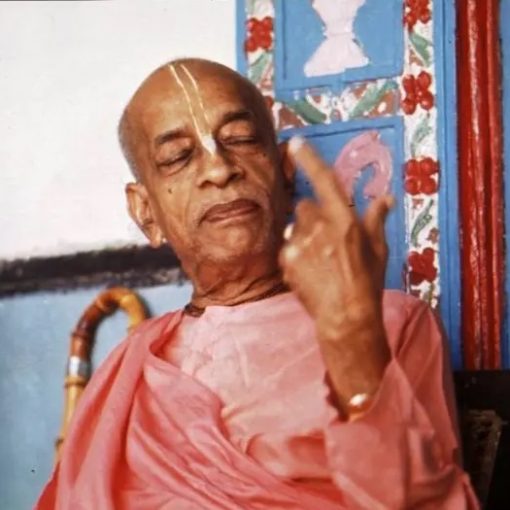Dhyāna-yoga
anāśritaḥ karma-phalaṁ
kāryaṁ karma karoti yaḥ
sa sannyāsī ca yogī ca
na niragnir na cākriyaḥ
Translation
The Supreme Personality of Godhead said: One who is unattached to the fruits of his work and who works as he is obligated is in the renounced order of life, and he is the true mystic, not he who lights no fire and performs no duty.
yogaṁ taṁ viddhi pāṇḍava
na hy asannyasta-saṅkalpo
yogī bhavati kaścana
Translation
What is called renunciation you should know to be the same as yoga, or linking oneself with the Supreme, O son of Pāṇḍu, for one can never become a yogī unless he renounces the desire for sense gratification.
karma kāraṇam ucyate
yogārūḍhasya tasyaiva
śamaḥ kāraṇam ucyate
Translation
For one who is a neophyte in the eightfold yoga system, work is said to be the means; and for one who is already elevated in yoga, cessation of all material activities is said to be the means.
na karmasv anuṣajjate
sarva-saṅkalpa-sannyāsī
yogārūḍhas tadocyate
Translation
A person is said to be elevated in yoga when, having renounced all material desires, he neither acts for sense gratification nor engages in fruitive activities.
nātmānam avasādayet
ātmaiva hy ātmano bandhur
ātmaiva ripur ātmanaḥ
Translation
One must deliver himself with the help of his mind, and not degrade himself. The mind is the friend of the conditioned soul, and his enemy as well.
yenātmaivātmanā jitaḥ
anātmanas tu śatrutve
vartetātmaiva śatru-vat
Translation
For him who has conquered the mind, the mind is the best of friends; but for one who has failed to do so, his mind will remain the greatest enemy.
paramātmā samāhitaḥ
śītoṣṇa-sukha-duḥkheṣu
tathā mānāpamānayoḥ
Translation
For one who has conquered the mind, the Supersoul is already reached, for he has attained tranquillity. To such a man happiness and distress, heat and cold, honor and dishonor are all the same.
kūṭa-stho vijitendriyaḥ
yukta ity ucyate yogī
sama-loṣṭrāśma-kāñcanaḥ
Translation
A person is said to be established in self-realization and is called a yogī [or mystic] when he is fully satisfied by virtue of acquired knowledge and realization. Such a person is situated in transcendence and is self-controlled. He sees everything – whether it be pebbles, stones or gold – as the same.
madhyastha-dveṣya-bandhuṣu
sādhuṣv api ca pāpeṣu
sama-buddhir viśiṣyate
Translation
A person is considered still further advanced when he regards honest well-wishers, affectionate benefactors, the neutral, mediators, the envious, friends and enemies, the pious and the sinners all with an equal mind.
ātmānaṁ rahasi sthitaḥ
ekākī yata-cittātmā
nirāśīr aparigrahaḥ
Translation
A transcendentalist should always engage his body, mind and self in relationship with the Supreme; he should live alone in a secluded place and should always carefully control his mind. He should be free from desires and feelings of possessiveness.
sthiram āsanam ātmanaḥ
nāty-ucchritaṁ nāti-nīcaṁ
cailājina-kuśottaram
yata-cittendriya-kriyaḥ
upaviśyāsane yuñjyād
yogam ātma-viśuddhaye
Translation
To practice yoga, one should go to a secluded place and should lay kuśa grass on the ground and then cover it with a deerskin and a soft cloth. The seat should be neither too high nor too low and should be situated in a sacred place. The yogī should then sit on it very firmly and practice yoga to purify the heart by controlling his mind, senses and activities and fixing the mind on one point.
dhārayann acalaṁ sthiraḥ
samprekṣya nāsikāgraṁ svaṁ
diśaś cānavalokayan
brahmacāri-vrate sthitaḥ
manaḥ saṁyamya mac-citto
yukta āsīta mat-paraḥ
Translation
One should hold one’s body, neck and head erect in a straight line and stare steadily at the tip of the nose. Thus, with an unagitated, subdued mind, devoid of fear, completely free from sex life, one should meditate upon Me within the heart and make Me the ultimate goal of life.
yogī niyata-mānasaḥ
śāntiṁ nirvāṇa-paramāṁ
mat-saṁsthām adhigacchati
Translation
Thus practicing constant control of the body, mind and activities, the mystic transcendentalist, his mind regulated, attains to the kingdom of God [or the abode of Kṛṣṇa] by cessation of material existence.
na caikāntam anaśnataḥ
na cāti-svapna-śīlasya
jāgrato naiva cārjuna
Translation
There is no possibility of one’s becoming a yogī, O Arjuna, if one eats too much or eats too little, sleeps too much or does not sleep enough.
yukta-ceṣṭasya karmasu
yukta-svapnāvabodhasya
yogo bhavati duḥkha-hā
Translation
He who is regulated in his habits of eating, sleeping, recreation and work can mitigate all material pains by practicing the yoga system.
ātmany evāvatiṣṭhate
nispṛhaḥ sarva-kāmebhyo
yukta ity ucyate tadā
Translation
When the yogī, by practice of yoga, disciplines his mental activities and becomes situated in transcendence – devoid of all material desires – he is said to be well established in yoga.
neṅgate sopamā smṛtā
yogino yata-cittasya
yuñjato yogam ātmanaḥ
Translation
As a lamp in a windless place does not waver, so the transcendentalist, whose mind is controlled, remains always steady in his meditation on the transcendent Self.
niruddhaṁ yoga-sevayā
yatra caivātmanātmānaṁ
paśyann ātmani tuṣyati
buddhi-grāhyam atīndriyam
vetti yatra na caivāyaṁ
sthitaś calati tattvataḥ
manyate nādhikaṁ tataḥ
yasmin sthito na duḥkhena
guruṇāpi vicālyate
viyogaṁ yoga-saṁjñitam
Translation
In the stage of perfection called trance, or samādhi, one’s mind is completely restrained from material mental activities by practice of yoga. This perfection is characterized by one’s ability to see the Self by the pure mind and to relish and rejoice in the Self. In that joyous state, one is situated in boundless transcendental happiness, realized through transcendental senses. Established thus, one never departs from the truth, and upon gaining this he thinks there is no greater gain. Being situated in such a position, one is never shaken, even in the midst of greatest difficulty. This indeed is actual freedom from all miseries arising from material contact.
yogo ’nirviṇṇa-cetasā
saṅkalpa-prabhavān kāmāṁs
tyaktvā sarvān aśeṣataḥ
viniyamya samantataḥ
Translation
One should engage oneself in the practice of yoga with determination and faith and not be deviated from the path. One should abandon, without exception, all material desires born of mental speculation and thus control all the senses on all sides by the mind.
buddhyā dhṛti-gṛhītayā
ātma-saṁsthaṁ manaḥ kṛtvā
na kiñcid api cintayet
Translation
Gradually, step by step, one should become situated in trance by means of intelligence sustained by full conviction, and thus the mind should be fixed on the Self alone and should think of nothing else.
manaś cañcalam asthiram
tatas tato niyamyaitad
ātmany eva vaśaṁ nayet
Translation
From wherever the mind wanders due to its flickering and unsteady nature, one must certainly withdraw it and bring it back under the control of the Self.
yoginaṁ sukham uttamam
upaiti śānta-rajasaṁ
brahma-bhūtam akalmaṣam
Translation
The yogī whose mind is fixed on Me verily attains the highest perfection of transcendental happiness. He is beyond the mode of passion, he realizes his qualitative identity with the Supreme, and thus he is freed from all reactions to past deeds.
yogī vigata-kalmaṣaḥ
sukhena brahma-saṁsparśam
atyantaṁ sukham aśnute
Translation
Thus the self-controlled yogī, constantly engaged in yoga practice, becomes free from all material contamination and achieves the highest stage of perfect happiness in transcendental loving service to the Lord.
sarva-bhūtāni cātmani
īkṣate yoga-yuktātmā
sarvatra sama-darśanaḥ
Translation
A true yogī observes Me in all beings and also sees every being in Me. Indeed, the self-realized person sees Me, the same Supreme Lord, everywhere.
sarvaṁ ca mayi paśyati
tasyāhaṁ na praṇaśyāmi
sa ca me na praṇaśyati
Translation
For one who sees Me everywhere and sees everything in Me, I am never lost, nor is he ever lost to Me.
bhajaty ekatvam āsthitaḥ
sarvathā vartamāno ’pi
sa yogī mayi vartate
Translation
Such a yogī, who engages in the worshipful service of the Supersoul, knowing that I and the Supersoul are one, remains always in Me in all circumstances.
samaṁ paśyati yo ’rjuna
sukhaṁ vā yadi vā duḥkhaṁ
sa yogī paramo mataḥ
Translation
He is a perfect yogī who, by comparison to his own self, sees the true equality of all beings, in both their happiness and their distress, O Arjuna!
yo ’yaṁ yogas tvayā proktaḥ
sāmyena madhusūdana
etasyāhaṁ na paśyāmi
cañcalatvāt sthitiṁ sthirām
Translation
Arjuna said: O Madhusūdana, the system of yoga which You have summarized appears impractical and unendurable to me, for the mind is restless and unsteady.
pramāthi balavad dṛḍham
tasyāhaṁ nigrahaṁ manye
vāyor iva su-duṣkaram
Translation
The mind is restless, turbulent, obstinate and very strong, O Kṛṣṇa, and to subdue it, I think, is more difficult than controlling the wind.
asaṁśayaṁ mahā-bāho
mano durnigrahaṁ calam
abhyāsena tu kaunteya
vairāgyeṇa ca gṛhyate
Translation
Lord Śrī Kṛṣṇa said: O mighty-armed son of Kuntī, it is undoubtedly very difficult to curb the restless mind, but it is possible by suitable practice and by detachment.
duṣprāpa iti me matiḥ
vaśyātmanā tu yatatā
śakyo ’vāptum upāyataḥ
Translation
For one whose mind is unbridled, self-realization is difficult work. But he whose mind is controlled and who strives by appropriate means is assured of success. That is My opinion.
ayatiḥ śraddhayopeto
yogāc calita-mānasaḥ
aprāpya yoga-saṁsiddhiṁ
kāṁ gatiṁ kṛṣṇa gacchati
Translation
Arjuna said: O Kṛṣṇa, what is the destination of the unsuccessful transcendentalist, who in the beginning takes to the process of self-realization with faith but who later desists due to worldly-mindedness and thus does not attain perfection in mysticism?
chinnābhram iva naśyati
apratiṣṭho mahā-bāho
vimūḍho brahmaṇaḥ pathi
Translation
O mighty-armed Kṛṣṇa, does not such a man, who is bewildered from the path of transcendence, fall away from both spiritual and material success and perish like a riven cloud, with no position in any sphere?
chettum arhasy aśeṣataḥ
tvad-anyaḥ saṁśayasyāsya
chettā na hy upapadyate
Translation
This is my doubt, O Kṛṣṇa, and I ask You to dispel it completely. But for You, no one is to be found who can destroy this doubt.
pārtha naiveha nāmutra
vināśas tasya vidyate
na hi kalyāṇa-kṛt kaścid
durgatiṁ tāta gacchati
Translation
The Supreme Personality of Godhead said: Son of Pṛthā, a transcendentalist engaged in auspicious activities does not meet with destruction either in this world or in the spiritual world; one who does good, My friend, is never overcome by evil.
uṣitvā śāśvatīḥ samāḥ
śucīnāṁ śrīmatāṁ gehe
yoga-bhraṣṭo ’bhijāyate
Translation
The unsuccessful yogī, after many, many years of enjoyment on the planets of the pious living entities, is born into a family of righteous people, or into a family of rich aristocracy.
kule bhavati dhīmatām
etad dhi durlabha-taraṁ
loke janma yad īdṛśam
Translation
Or [if unsuccessful after long practice of yoga] he takes his birth in a family of transcendentalists who are surely great in wisdom. Certainly, such a birth is rare in this world.
labhate paurva-dehikam
yatate ca tato bhūyaḥ
saṁsiddhau kuru-nandana
Translation
On taking such a birth, he revives the divine consciousness of his previous life, and he again tries to make further progress in order to achieve complete success, O son of Kuru.
hriyate hy avaśo ’pi saḥ
jijñāsur api yogasya
śabda-brahmātivartate
Translation
By virtue of the divine consciousness of his previous life, he automatically becomes attracted to the yogic principles – even without seeking them. Such an inquisitive transcendentalist stands always above the ritualistic principles of the scriptures.
yogī saṁśuddha-kilbiṣaḥ
aneka-janma-saṁsiddhas
tato yāti parāṁ gatim
Translation
And when the yogī engages himself with sincere endeavor in making further progress, being washed of all contaminations, then ultimately, achieving perfection after many, many births of practice, he attains the supreme goal.
jñānibhyo ’pi mato ’dhikaḥ
karmibhyaś cādhiko yogī
tasmād yogī bhavārjuna
Translation
A yogī is greater than the ascetic, greater than the empiricist and greater than the fruitive worker. Therefore, O Arjuna, in all circumstances, be a yogī.
mad-gatenāntar-ātmanā
śraddhāvān bhajate yo māṁ
sa me yukta-tamo mataḥ
Translation
And of all yogīs, the one with great faith who always abides in Me, thinks of Me within himself and renders transcendental loving service to Me – he is the most intimately united with Me in yoga and is the highest of all. That is My opinion.





